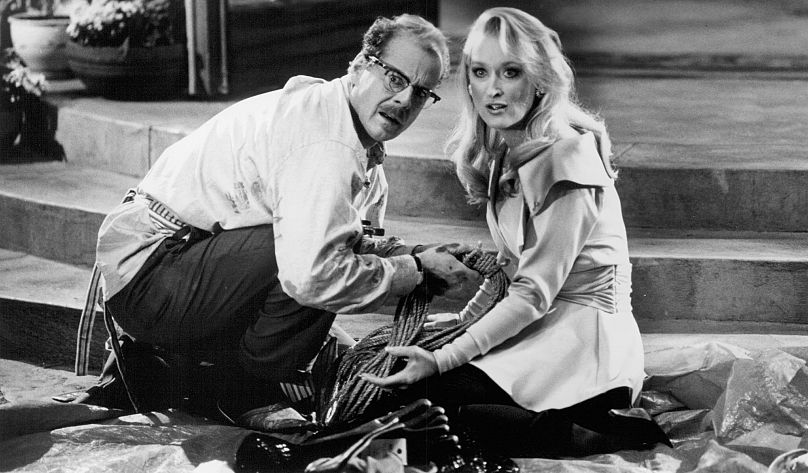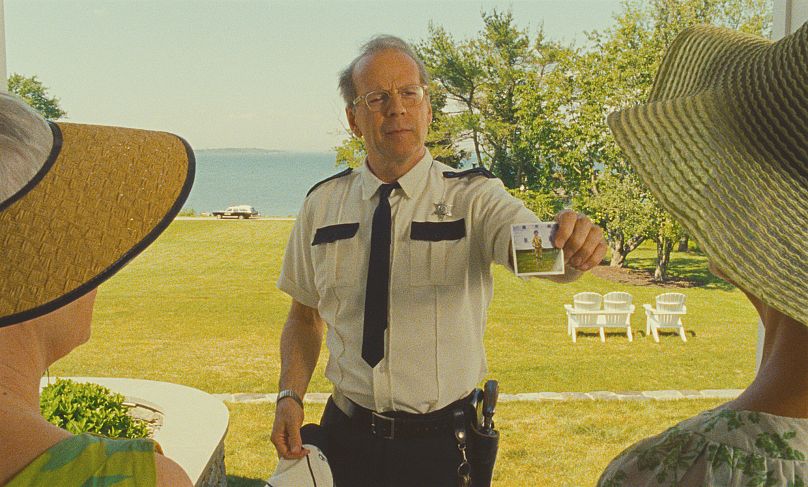
Almost a year since Bruce Willis stepped away from acting, his family has confirmed that the star has been diagnosed with frontotemporal dementia (FTD).
FTD is an uncommon type of dementia that causes problems with behaviour and language. It’s a terrible tragedy and puts paid to the decision by the 67-year-old to permanently retire from the work that made his name.
While others articles are focussing on the sadness of his family and friends at the degenerative diagnosis, we thought we’d take the chance to look back at some of the fantastic roles Willis has played over the years.
Death Becomes Her

Following on from Bruce Willis’ appearance in the first two Die Hard films, a role in black comedy Death Becomes Her might have seemed like a rather rogue career move for a star best known for his turns in action movies.
However, the 1992 camp classic was a huge box office hit, grossing $149 million (approximately €140 million) and it’s an endlessly entertaining romp through the lives of Beverly Hills’ elite.
Willis takes the part of Dr. Ernest Menville, a successful plastic surgeon who’s fought over by actress Madeline and writer Helen — respectively played by Meryl Streep and Goldie Hawn. The film follows the battle for Dr. Ernest’s affections all while Madeline and Helen fight against the ageing process.
What follows is a darkly hilarious journey which sees the two female leads taking a mysterious potion which is said to grant eternal life — and youth — to those that drink it. Unsurprisingly, throughout the course of the film, they both learn that immortality inevitably comes at a price. If you can stomach some fairly gruesome scenes — don’t worry, they’re all computer generated and even won the 1992 Oscar for Best Visual Effects — alongside top notch comedy, you’ll love Death Becomes Her.
The Robert Zemeckis-directed cult favourite is one of Willis’ most entertaining turns and certainly shows his range. His portrayal of an unravelling Dr. Ernest — who becomes an alcoholic and is forced to give up his lucrative career to work as a reconstructive mortician — struggling to cope with the two eccentric women fighting over him is laugh out loud funny throughout.
His character, whose arc takes place over several years, is multifaceted and endlessly entertaining. Willis, Streep and Hawn are possibly the perfect cast and have made this superb film a cult classic for all types of audiences. Even though it’s now — horrifyingly — 31 years old, it’s barely dated and still serves as an incredibly witty, tongue-in-cheek morality tale. It’s well worth watching over and over again, as each viewing brings more nuance, and I’d venture that it’ll make you fall in love with Bruce Willis even more. Saskia O’Donoghue
Moonrise Kingdom

There’s nothing like a Wes Anderson film to draw out new shades from an all-star cast. Willis is no exception to the rule, as he brings his particular brand of masculine no-nonsense energy to the whimsical world of my favourite Anderson film, 2012’s Moonrise Kingdom.
Set on a remote island, Moonrise Kingdom follows the journey of orphan Sam, who escapes his scout group’s camping trip to abscond with the love of his young life, Suzy. Oozing with typical Anderson charm, the film’s focus on the unabashed trenches of adolescent love is given prophetic fallacy in the form of an incoming storm, as well as a severe Social Services (an always excellent Tilda Swinton), which both threaten to break the lovebirds apart.
And right in the eye of this literal and figurative storm is a sad old man, Island Police Captain Duffy Sharp, played with intelligent melancholy by Willis. He still carries the solemn gravity that imbues his iconic action roles in films like Die Hard, but in Anderson’s hands, we see Willis’ masculinity challenged by a character who is clearly grappling with how that machismo has made him lonely.
The solid-gold heart of the film is the absolute belief it has in the love of its young protagonists, but second to that is the way Willis’ Sharp empathises with the orphan story of Sam. He chooses to stand up to Social Services and ensure Sam doesn’t get put into the care system, taking him under his wing instead as an adoptive father. Most of Anderson’s father figures are far from perfect. But instead of suffering from the typical narcissism of a character like the Tenenbaum’s patriarch, Sharp is one of the purest — and it’s a role only Willis could have pulled off. Jonny Walfisz
Pulp Fiction

«Zed’s dead, baby. Zed’s dead.»
It’s arguably one of the most memorable lines in film history, as Bruce Willis — playing professional boxer and bad-ass Butch Coolidge — rides off on a motorcycle with his girlfriend Fabienne following a very unfortunate series of events involving a sinister ‘gimp’ and someone (Zed) getting shot in the crotch.
Pulp Fiction was my gateway to Tarantino fandom, back in the 2000’s when I’d re-watch it repeatedly on one of those portable DVD players, blue-tacking a poster of Uma Thurman as Mia to the slanted ceiling above my bed. Everything about it just felt socool.
Back in 1994, Pulp Fiction was released to much critical acclaim, winning the coveted Palme d’Or and Oscar for Best Screenplay Written Directly for the Screen. The public reception was similarly enthusiastic, with audiences captivated by the unconventional narrative, extreme violence and playful pastiches to pop culture.
One of Tarantino’s many skills as a filmmaker is seeing the potential in performers that have previously been confined to stereotypes or become forgotten as a new generation takes the lead. Bruce Willis is a great example of this, having made a series of straight-to-VHS flops before being cast as Butch, the burnt-out boxer past his prime who double-crosses his boss before going on the run.
Willis reportedly took a huge pay cut to make Pulp Fiction, a wise decision that ultimately led to him recovering his movie star status — and millions more dollars in return. Most importantly, it showed just how versatile an actor he is, able to texture his action hero persona with nuanced emotion and an edge of humour, even with so few lines to say.
As Tarantino said during an interview with podcast ‘2 Bears,1 Cave’, «It’s like winning the f***ing lottery, getting Bruce.» Amber Bryce
Over The Hedge
Not only is Bruce Willis an incredible on-screen actor, but he’s also an equally wonderful voice actor.
One of my favourite films growing up was Over The Hedge, a 2006 DreamWorks animated movie that my family had on VHS, and which my sister and I probably watched a thousand times. I loved it as a kid and I’m still finding more to adore about it as an adult.
Willis voices the character of RJ, a scheming racoon who convinces a group of forest animals to help him raid a recently built suburban development to repay a food-related debt that he owes to a menacing bear named Vincent. It essentially plays out like a heist movie.
Along the way, the gang of animals face off against ferocious “soccer moms” and pest terminators (the Verminator), and RJ learns valuable lessons about friendship, trust, and the importance of family.
The film is a whole lot of fun and one that will always have a special place in my heart.
But _Over the Hedge_’s real area of praise belongs to its incredible cast of voice actors: including Garry Shandling, Steve Carell, Catherine O’Hara, Eugene Levy, Avril Lavigne, and of course, Bruce Willis.
It still blows my mind that Willis actually voiced this small, larger than life furry creature, as it really sounds nothing like he does in real life. He did an absolutely tremendous job in bringing RJ’s character to life and it’s a true testament to his skills as a voice actor. Theo Farrant
Sixth Sense

I still remember the first time I saw Sixth Sense. My dad would host monthly film nights for a small group of friends and sometimes my younger sister and I would be allowed to stay up late and watch the (often age inappropriate — this might have been a double bill with The Blair Witch Project) screenings.
Sixth Sense made such an impression on me as a child that I couldn’t sleep for weeks, scared I’d wake up one night to a vomiting girl crawling out from underneath my bed and the realisation that everyone around me was a troubled ghost (what a nightmare for an anxious introvert).
While it might seem like a bland choice for a Bruce Willis favourite, M. Night Shyamalan’s 1999 thriller is a classic for a reason, with one of the most memorable twists of all time and the much-parodied line “I see dead people” etched into our collective consciousness.
Willis plays child psychologist Dr. Malcolm Crowe who, in a traumatic opening scene, is confronted by an ex-patient that shoots both him and his wife before turning the gun on himself. Months later, a grieving — and surprisingly still alive — Crowe is assigned to work with a boy named Cole that claims he can see and talk to dead people.
It’s an understated performance from Willis, with a character that’s mostly forgettable when held up against the likes of John McClane, Korben Dallas or Butch Coolidge. Yet the _Sixth Sense_’s place within the pantheon of 90s cinema greats makes it a staple of the brilliant actor’s filmography, and one that might never have landed that final shock revelation quite as well without him. Amber Bryce
Unbreakable

Despite its giveaway title, I don’t remember having read or heard anything about M. Night Shyamalan’s second collaboration with Bruce Willis before seeing this film, but I’ll never forget how I felt as the story unfolded. And the thrill I still get from seeing it again and again.
Willis plays David Dunn, the sole survivor of a rail crash who emerges unscathed. Shortly after he meets Samuel L. Jackson whose strangely fragile character Elijah Prince has spent much of his life searching for people like Dunn who walk away unharmed from disasters.
Now, anyone who grew up on a solid fare of comic books will love and recognise the slow birth of the unwitting hero. A man who just, it seems, happens to be in the right place at the right time. It’s only after Prince introduces the idea that Dunn’s role in life-changing events may not be coincidental that he starts to wonder about his very existence. Unlike so much of today’s superhero servings, the special effects are very low-key and credit should go to the director for keeping the suspense sufficiently chilled and ever present.
The parallels with classic comic book drama are even pointed out by Jackson’s crippled character as Willis slowly embarks on a voyage of self-discovery. Willis and Jackson strike just the right note as they circle each other, pulling you into their burgeoning bromance.
I really don’t want to spoil the story for those who haven’t watched it, but it’s an entertaining twisty ride with a worthy touching but tragic pay-off. Tokunbo Salako

